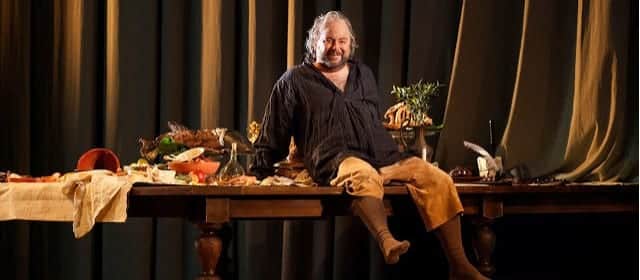The most common English idiom people use when they want to express the idea that they would rather be a living coward than a dead hero, or that to speak out for something they felt strongly about could weigh heavily against them is ‘discretion is the better part of valor.’ It is a slight warping of the actual Shakespeare quote: ‘the better part of valor is discretion.’
The line comes from Shakespeare’s play, Henry IV Part 1, Act V Scene 4. It’s spoken by Shakespeare’s popular knight, Sir John Falstaff, who appears in no fewer than four of his plays. For context, the full quote reads:
‘To die is to be a counterfeit, for he is but the counterfeit of a man who hath not the life of a man; but to counterfeit dying when a man thereby liveth is to be no counterfeit, but the true and perfect image of life indeed. The better part of valor is discretion, in the which better part I have saved my life.’
The line means that you would be foolish to act like a hero if it is going to disadvantage you and it’s better to stop yourself if an action you would like to take is going to hurt you. But in the case of Falstaff, it is deeply cynical. One of the main themes of the play is honor. Shakespeare looks at honor from several angles and the character and actions of Falstaff, highly comical and hugely entertaining, is a close, serious look at one of those aspects of honor – in Falstaff’s case the lack of honor.
Falstaff, a fat, corrupt, alcoholic, gluttonous old man – a liar and a thief – frequents the Boar’s Head Tavern in Eastcheap, surrounded by a gang of dodgy characters, including thieves and prostitutes. Hal, the teenage Prince of Wales (a title given to the King’s eldest son) has rejected his royal duties, turned his back on court life and joined them. While surrounded by criminals he has personally avoided committing any crimes but spends his days and nights in their company. Falstaff believes himself to be a close friend of the prince while to the prince Falstaff is an amusing companion from whom he is learning about the underbelly of the kingdom he will eventually rule over. This is one of Shakespeare’s ways of showing the preparation of a young prince for good governance when he eventually becomes Henry V. Of all Shakespeare’s kings Henry V is his idea of the perfect monarch.
In the meantime his father, King Henry IV, has given up on his heir and relies on his second son, John, to support him. However, towards the end of the play, Henry is faced with a serious rebellion, led by Henry Percy and his son, Harry Hotspur. Prince Hal decides to abandon his own rebellion against his father and join the fight against this serious danger. He recruits his friends from the Boar’s Head and appoints Falstaff as an officer.
Falstaff begins by conscripting wealthy men in order to get them to bribe him to let them off. He ends up with a company made up of the poor and disabled, most of them beggars. He avoids action and in one of the great scenes in the play behaves in the most dishonorable way possible.
The prince encounters rebel leader Hotspur on the battlefield and they fight. Falstaff turns up and watches the fight. One of the rebel leaders arrives and begins fighting Falstaff. Falstaff falls down and pretends to be dead. Hal kills Hotspur and makes a short speech in his honor. He sees what he thinks is the dead body of his old friend and makes a short comic speech over his body in which he makes dismissive comments about the corrupt old man.
When he’s gone Falstaff gets up. He tells himself that he has saved his life by pretending to be dead. ‘The better part of valor is discretion,’ he says.
He gets even more dishonorable. Hal has dragged Hotspur’s body along and placed it beside Falstaff. When he has gone Falstgaff gets up and looks at Hotspur’s body. He says he has to make sure the rebel is dead in case he gets up again. He stabs the body several times with his sword then lifts it on to his back and carries it off. He boasts to those he meets that he has fought with and killed the rebel leader. When Hal challenges him he says that although Hal struck him down he didn’t actually kill him. Both of them, wounded only, rose up and fought in a mighty battle in which he, Falstaff, killed Hotspur.
The Falstaff story in this episode in the play is a wonderfully comical part of Shakespeare’s examination of the theme of honor.

Craig Colclough as Falstaff




You have no understanding of Falstaff who stands against the murderous regime of the king and cherishes the blessing of life. a man of great courage.
Although I later specialised in Chemistry,Henry Fourth part 1 was our O-level text along with Lord of the Flies and a High wind in Jamaica.
Falstaffs cynical comments about Honour and War remain as fresh today as they did in 1966 and as they did when first committed to foolscap in the 1590’s.